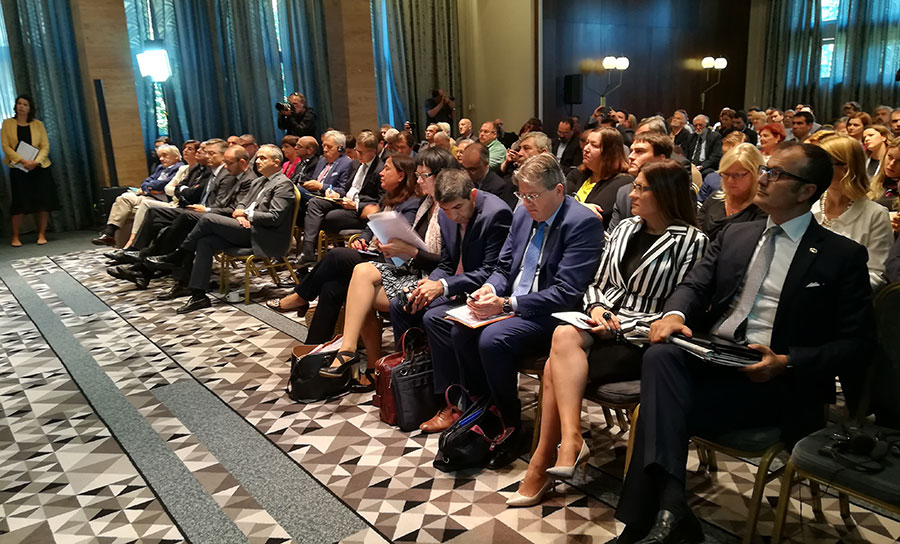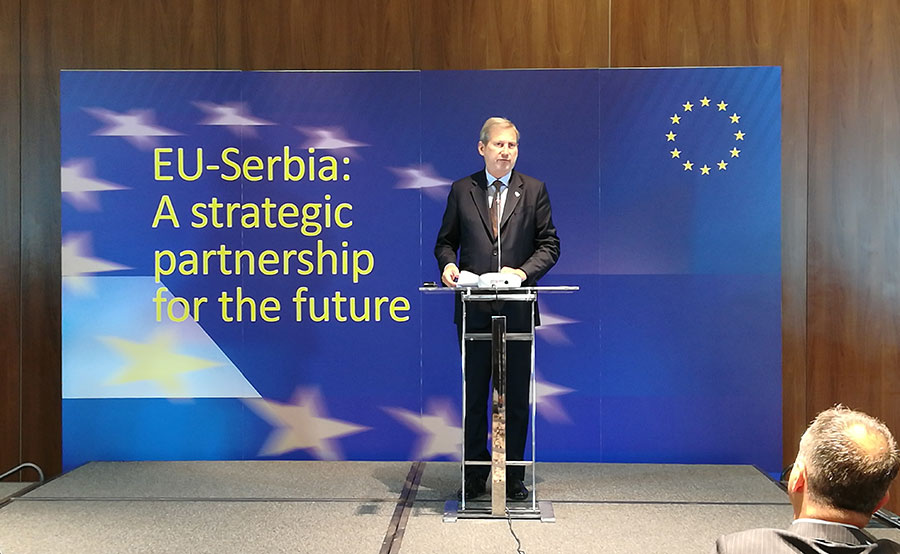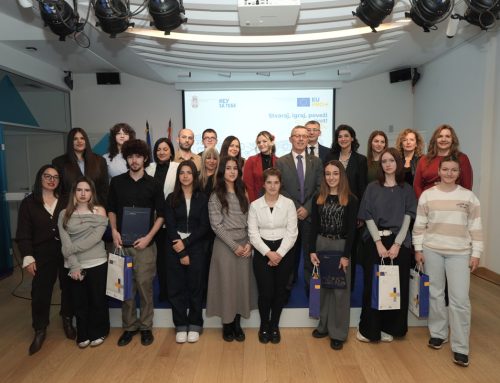Johannes Hahn, Commissioner for European Neighbourhood Policy and Enlargement Negotiations participated today in Belgrade in the event ‘EU-Serbia: A strategic partnership for the future’ organised by the National Convent for the EU.
Commissioner Hahn delivered a speech and had an exchange with representatives of civil society organisations.
Speech of Commissioner Hahn
Belgrade, September 15, 2017
Check against delivery!
It is really a pleasure for me to be here in Belgrade again, for the tenth time since I took office. I think that figure shows you how important this country is to me.
More broadly: it tells you something about the geostrategic importance of Serbia and the entire region of South East Europe for the EU.
Serbia’s accession to the EU is not only this nation’s own stated strategic goal. It is also the EU’s firm and unquestionable objective. It has been reaffirmed by our EU Summit in March, the Trieste Western Balkans Summit in July, and just this week by President Juncker in his State of the Union speech.
As I often say, geography is destiny. For too long, Serbia and the so-called Western Balkans have been seen as the backyard of Europe. Today, people see that this region is already an enclave in the European Union, with the legitimate right to join.
Ladies and gentlemen,
The fall of the Berlin wall and the iron curtain was the beginning of the reunification of our continent, “crowned” by the enlargement of the EU to 28 Member States so far.
But this process, which began in 1989, will only be complete with the accession of all the six countries of Western Balkans to the European Union. It would be self-defeating to conceive and build our common future without Serbia and its neighbours the region. It is as simple as that.
So our commitment to Serbia is firm, and it is clear. As President Juncker said this Wednesday in his State of the Union address:
“If we want more stability in our neighbourhood, then we must maintain a credible enlargement perspective for the Western Balkans.”
The Commission also just sent its latest “letter of intent” to the Council and European Parliament – our strategic priorities so to say.
And in there, we say very clearly that we will further intensify our work with the entire region and in particular with Serbia and Montenegro as frontrunner candidates, for their successful EU accession.
So there can be no question at all about where we are heading together. [And we say that this is done with a 2025 perspective.]
Already today, the EU and its Member States are by far Serbia’s first economic partners, in volume of trade, in terms of foreign investment and in financial assistance – well ahead of any other partners. The EU institutions’ financial assistance alone to Serbia amounts to about EUR 200 million annually.
 I am not talking about loans that you have to pay back. These are non-repayable grants which we invest in your country, some EUR 3 billion since 2000. This is a clear indication of our commitment, especially at a time when EU funds are scarce.
I am not talking about loans that you have to pay back. These are non-repayable grants which we invest in your country, some EUR 3 billion since 2000. This is a clear indication of our commitment, especially at a time when EU funds are scarce.
Another example: companies from the country I know best, Austria – not exactly the largest state on the planet – invests four times more in Serbia than Russian companies.
But again: all this is not social work or a philanthropic gesture. This is an investment in peace, prosperity, stability and security. It is a joint guarantee for the EU and Serbia’s safe and prosperous future.
Others may tell you there are alternatives. That your sovereignty is best kept and cultivated alone, drawing on your rich history; that this region could look inward rather than beyond its borders; or that other “clubs” are more interesting and nicer company.
Well, let me tell you one thing: Your EU perspective is not a brake or hindrance to your nation and the role it wants to play internationally. On the contrary!
Of course, the EU is not some heavenly political creature. It is not political paradise. As in all clubs, its membership comes with a few strings attached.
But the friendship of other nations comes with big Trojan horses. Therefore, frankly, I believe that joining the world’s largest and wealthiest market, half a billion of free people with increasing punch on the global stage, is a pretty good plan! At least I don’t see a better one for this region.
In the light of all this, it is no surprise that we are making steady progress in the accession negotiations with Serbia.
Serbia has come a long way from isolation, recession and instability, and is now a respected political and economic player in the region and beyond.
So where do we stand today: Ten of the thirty-five negotiating chapters are already open, with two of them being provisionally closed. Three more chapters are, as we speak, being discussed by Member States and I hope can be opened in the near future.
Serbia has also advanced preparations on a number of other chapters. I would be very pleased if we could open all chapters in the next 12 to 18 months, provided Serbia meets the necessary requirements. That would provide even further momentum.
But let’s not get caught up by the mechanics of the process, important as they may be. The real objective is to maintain a good overall pace of negotiations and keep our eyes fixed on the big prize: accession!
Let us not forget that, in some ways, the actual process of preparing for EU membership is as important as the final goal. You got to get ready! And the pace of Serbia’s accession negotiations actually depends on Serbia’s proven ability to implement reforms, in particular in the rule of law area.
I always say: there is no speed limit on the highway to membership. But ultimately, quality goes before speed.
This focus on quality is crucial: not only because of the importance that the rule of law, an independent judiciary, the full respect of human rights and a functioning, transparent public administration have for Serbia’s citizens.
But also because the rule of law and economic development go hand in hand! This is the model which the EU itself is founded upon. It is thanks to this smart mix of democratic values, fundamental rights and free market economics that the EU managed to build its prosperity.
As President Juncker said it: “The rule of law is not optional in the European Union. It is a must. Our Union is not a State but it is a community of law.”
This is why, in Serbia’s very own interest, I strongly believe that rule of law issues need to become more of a political and work priority in Serbia. This will have a direct and tangible impact on citizens’ lives, employment and business opportunities.
Strengthening the independence, impartiality and efficiency of the judiciary; stepping up the fight against corruption and organized crime; creating an environment that fully guarantees the freedom of expression and of the media are not minor challenges. But they are key! And you don’t do this to do me a favour – but for yourselves.
Of course: Addressing these challenges will take time. The rule of law is not instant coffee. These reforms require great involvement, not only from the Serbian government, but from all stakeholders and Serbian society. But they are crucial. Make no mistake! Our Member States and investors both watch this space very carefully.
Talking about investors: On the economic front Serbia needs to be commended for its good performance on budget consolidation and competiveness over the last years.
These efforts have started to bear fruit, with Serbia’s return to growth, and good results of cutting the budget deficit.
Still, much remains to be done in order to unleash all of Serbia’s economic potential, which can really be a locomotive for the wider region..
Again, let’s look at the bigger picture: in a globalized world, we are all small players at the end of the day. Our Member States teamed up and have – step by step – created the largest ever single market, allowing investors to reach a large number of clients and consumers. Size matters!
This is why we all endorsed at the Trieste summit in July the concept of a Western Balkan regional economic area, which shall upgrade the current Central European Free Trade Agreement (CEFTA).
This regional trade liberalization is not an alternative to EU accession! It is neither a side-track, nor a waiting room. It does not change or delay your firm path to become EU members.
On the contrary: it is a stepping stone in your preparation for joining the EU’s single market.
 And in parallel, it addresses some of the structural weaknesses of the region: size, which I mentioned, but also underdeveloped supply chains. Also here, Serbia has a key role to play as the current chairman in office of the CEFTA.
And in parallel, it addresses some of the structural weaknesses of the region: size, which I mentioned, but also underdeveloped supply chains. Also here, Serbia has a key role to play as the current chairman in office of the CEFTA.
So pushing forward with the rule of law and economic reforms is crucial. But there is a third critical priority for Serbia: the dialogue with Kosovo.
As you know, the normalization of relations with Pristina is an issue that has a direct impact on further progress in your accession negotiations, via Chapter 35.
Not because Kosovo would have a say over Serbia’s progress towards the EU, or vice versa. That is absolutely not the case. Enlargement is clearly based on the own merits of each country. You hold your own key to the door of our Union!
But the EU must see a permanent, binding, sustainable and irreversible normalization of relations before Serbia’s final accession. Simply, to be frank, because we don’t want to import this issue through our own back door!
I am not here to tell you how your leaders should run this dialogue – which achieved quite a few things so far. And I am not here either with a blueprint or model. Because you must make your own choices!
But I will tell you this: You must make up your mind rapidly, as a society, and keep the focus on the bigger, strategic picture!
As a politician I know how sensitive and emotional such issues can be. My own country, Austria, had its fair share of them.
But I also see the great historical opportunity now to reach out to the other side and find a lasting solution for this issue, which has haunted your country and the region for too long.
Let’s not forget that European integration in itself started after the most devastating war and the biggest crimes committed in human history. The European success story literally started on the ashes of destruction.
Yet, integration and reconciliation were not about denying the facts and the responsibility for them. They are not about just turning the page. They were about learning from history and building a better future together.
Ultimately, this is the key goal: a better future for this great nation, its children and grandchildren!
That was what citizens in Europe at the time rightly wanted. And it is what the people of this country overwhelmingly want.
The courage, vision and the sense of realism of our European founding fathers, and the support they received from their people, should therefore be an example and encouragement for this region and this country, too.
Being a patriot and a European is not a contradiction. In a globalized world, in which all states are small states, they are two sides of the same coin.
In turn, if you do not get it right under your own terms and ideas and miss this rendezvous with history, others will try to make choices for you, to your detriment.
Such defining decisions require the widest possible national consensus, away from party politics. This is why the initiative of President Aleksandar Vučić to launch an internal national dialogue is a very important step in the right direction. It demonstrates his vision and courage, his realism but above all his strong commitment to his nation and its interests. You will all have seen his address on Tuesday evening.
Now, there is no time to be lost. I really do hope that you seize this opportunity and collectively discuss the European future of your country and what it entails until the end of this year.
What is crucial now is that you launch an open, constructive internal debate in which you look to the future – and not to the past.
This regional cooperation and reconciliation doesn’t’ start from scratch. Much has been done since 2000, including under the leadership of PM Vucic and now of PM Brnabic.
Serbia has made commendable efforts to improve bilateral relations with its neighbours.
I would like to thank Prime Minister Brnabić, who in a very short time has already helped to build a positive agenda for the region in the Western Balkan summit in Trieste in July and the Prime Ministers’ meeting in Albania in August, reaching out to neighbours and deepening the connectivity agenda in the economic area, with great potential for growth and investments, but also for stability in the region.
This is the real European attitude that we want to see: A forward-looking approach, combining your reforms and the interests of your country with reaching out to neighbours.
Let me make a similar point: Serbia is also an important EU foreign policy partner.
It already contributes to EU civil and military crisis management missions. With 20 staff, this is already the biggest CSDP contributor in the Western Balkans.
Serbia’s commitment to EU membership also implies that it progressively aligns with the EU’s Common Foreign and Security Policy by the date of accession. As an important EU partner and as a candidate country, Serbia needs to make additional efforts in this respect.
This does not mean to cut ties with other partners, ties and relationships that have grown over time and are perfectly understandable and legitimate. Joining the EU doesn’t mean you can’t have any other friends and partners.
But it means Serbia needs to increasingly translate its EU strategic priority into concrete policies and decisions. The EU Common Foreign and Security Policy leaves room for developing bilateral relationships with countries which are not EU members – as long as the common framework is respected.
Ladies and gentlemen,
Let me conclude. The story of the EU and Serbia is one of an ever closer friendship, to the point of full accession.
In his State of the Union speech, President Juncker set out the way ahead, an approximate timeframe that is possible, but especially what is required: reforms, reforms, and reforms, notably on the rule of law.
But as I said: it is not just practical policies and cooperation that bring us together. It is both fundamental values and interests that bind the EU and Serbia to one another in a deep friendship.
Let’s not forget this, please! We have seen EU over the last decades that one can “accuse Brussels” of many challenges that we face, from the economy to migration and security.
The EU is, in a strange way, a perfect scapegoat. But in the end, this “scapegoating” is completely counterproductive and comes back with a vengeance to the people who practice it. Just think about one island nation in Northwestern Europe, which is now paying a high price…
In other words: we mean it when we say: “Your future lies in the EU.” We want you in our club! As President Juncker said on Wednesday: Our Union will be greater than 27 in number!
Now it is up to Serbia, with our unwavering support, to tackle the tough calls that come with this historical process.
And in the next two years of this Commission’s mandate, I will help you, as a frontrunner, make as much progress as possible on this irreversible path.
Thank you very much.




